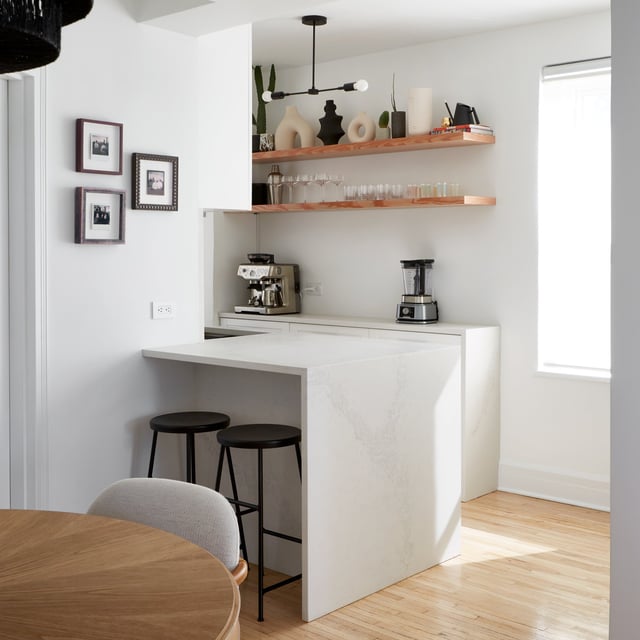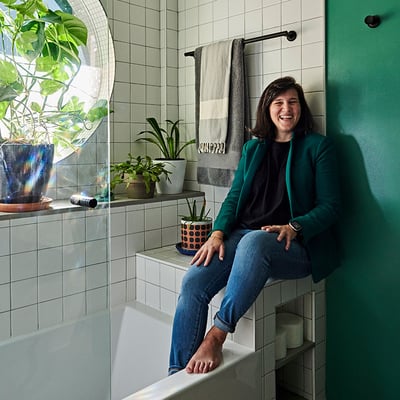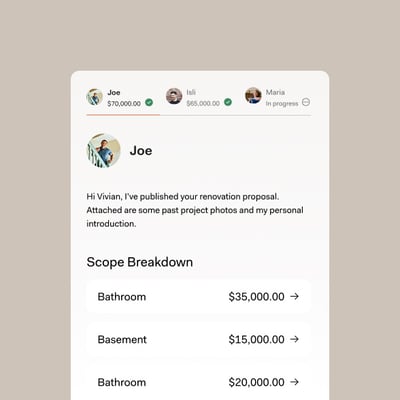
New York
Buffalo, NY Basement Renovations: Costs & Smart Design Choices
02.25.2026


In This Article
The median price for a home renovation in New York City, including labor and materials, ranges from $91,000 to $163,000. There are a lot of factors that influence the pricing, including the scope of work and complexity, size of the home, materials used, age of the building, and more.
Design a Home That’s Uniquely Yours
Block can help you achieve your renovation goals and bring your dream remodel to life with price assurance and expert support.
Get Started
There are a range of factors that influence home renovation costs in New York City. From the size and scope of the project to the materials chosen and building requirements, every detail plays an important role in determining the price. It helps to understand these factors so you can properly plan your remodel budget.

Labor costs typically account for the majority of a home renovation budget. You should expect to spend around 60% of your budget on labor. Labor fees will vary based on the scope and complexity of the project, and they might include hiring a general contractor, electrician, plumber, or other subcontractors.
A designer can help you to select materials, plan your layout, and bring your overall vision to life with your remodeled space. While it’s more expensive than doing it on your work, working with a designer can ensure you make smart choices. The cost of hiring a designer can greatly vary and significantly impact your budget. Block makes it easy by offering a range of design services so you can choose the support you need.
In an average renovation, you should expect to spend 30% of your budget on materials, but material costs can vary significantly. Materials may include flooring, tiles, paint, fixtures, cabinets, appliances, and other supplies needed for your particular project. It’s important to research material pricing and quality and try to find a balance that works for your budget. We recommend staying flexible with your material selections, as items can go out of stock or increase in price.
There are a variety of additional costs that could be included in your renovation. These may include expenses for demolition and debris removal, relocation costs, hardware or light fixtures, other accessories, and decor. It’s crucial to avoid maxing out your budget without accounting for these additional expenses.
No matter how well you plan your project, renovations can still bring unexpected surprises. You may discover mold, rot, or the need for essential plumbing or electrical updates. Setting aside a contingency fund of approximately 10% of your budget will provide the flexibility needed to handle unforeseen expenses and keep your project on track.
Turn your renovation vision into reality
Get matched with trusted contractors and start your renovation today!
Find a Contractor
A gut renovation involves completely stripping down the interior of your home, by removing walls, floors, ceilings, and sometimes plumbing and electrical systems. This allows you to completely redesign the space.

In contrast, a non-gut renovation—sometimes called a cosmetic renovation—entails surface-level updates or changes that don’t require major structural alterations. This might include only updating specific rooms or work such as painting, flooring, or other less intensive remodels.
A gut renovation is significantly more expensive since you’re either taking down walls or stripping them back completely. You should expect to spend over $100,000 for a full gut renovation, but pricing will depend on the size of your space, complexity of the work, and other factors.
A non-gut renovation is less expensive because you’re remodeling the space within the existing walls. Below are the median prices for NYC remodels by room type, though these prices can vary depending on specific project details:
| Room Type | Price Range (including labor and materials) |
| Addition | $212,000–$380,000 |
| Attic | $26,000–$46,000 |
| Basement | $56,000–$100,000 |
| Bathroom | $33,000–$60,000 |
| Bedroom | $23,000–$40,000 |
| Deck | $34,000–$60,000 |
| Foyers | $12,000–$22,000 |
| Garage | $49,000–$88,000 |
| Kitchen | $35,000–$63,000 |
| Laundry | $9,000–$17,000 |
| Living Space | $35,000–$64,000 |
The cost of permits can vary depending on the type of work being done, but you should expect to spend between $2,500 to $5,000 on permits in NYC. This estimate includes not only the permitting fees but also the costs for licensed professionals to file, perform, and insure the work. Permitting costs can be higher if a Registered Architect is required.
It’s essential to obtain permits to comply with local regulations and avoid legal complications or potential fines. Your contractor should work with the city building department, your property management company, and any other relevant parties to determine the necessary permits for your project.
Another factor to consider is the condo or coop board approval process. Depending on your building type, its rules, and existing conditions, this process can impact what work is allowed and how it’s executed, which can impact costs.
When renovating a kitchen or bathroom in New York City, obtaining the proper permits is essential to ensure your project complies with local building codes and regulations. Whether you're reconfiguring plumbing, updating electrical systems, or making structural changes, permits are required to protect both homeowners and contractors. Understanding the permit process can save you time and prevent costly delays. Learn more about navigating New York City kitchen permits and New York City bathroom permits to streamline your renovation.
Renovate with confidence every step of the way
Step 1: Personalize Your Renovation Plan
Step 2: Receive Quotes from Trusted Contractors
Step 3: Let Us Handle the Project Details

Wet spaces are parts of the home that are exposed to water or high humidity, such as bathrooms, laundry rooms, and kitchens. Renovating these spaces is more expensive because it typically requires specialized labor, such as plumbing, tiling, waterproofing, and installing fixtures and appliances. It’s important to hire experienced professionals for wet spaces because the work is complex and mistakes can be costly. Material costs are also higher in these areas because they need to be waterproof and durable.
Learn more: A Complete Guide to Bathroom Renovation Costs in New York City

Dry spaces are areas that do not require extensive waterproofing or plumbing work, such as bedrooms, living rooms, and dining rooms. Renovations in these spaces are less expensive because the work involved isn’t as complex, typically including tasks like painting, flooring, and electrical work.

New York City has a humid subtropical climate, with hot, humid summers and cold winters. Because of this, it’s important to make sure your HVAC system can keep your home temperature comfortable year-round. Heating and cooling costs are significant considerations in an NYC remodel and are influenced by the type of HVAC systems installed, the energy efficiency of the equipment, and the specific requirements of your building.
Central air is common in larger buildings and homes. It can be expensive to install or upgrade these systems because it requires ductwork, high-capacity units, and advanced thermostats.
Homeowners often choose split systems because of their flexibility and energy efficiency. These systems can be installed in individual rooms or areas of the home. Additionally, they’re easier to install in older buildings without existing ductwork, which makes them more cost-effective.
Radiant heating is the most luxurious option, involving the installation of heating elements under floors or within walls. It’s more expensive to install, but it may be worth the splurge for the comfort it provides on cold winter mornings.
The cost of installing heating and cooling systems varies significantly depending on the type of system, type of building, existing conditions, and other factors. Homeowners should expect to spend anywhere from $2,000 to tens of thousands of dollars updating or installing their heating and cooling systems.
While you may be focused on the immediate costs of installing an HVAC system, it’s essential to consider the ongoing operational costs. Modern, energy-efficient systems typically cost more to install but offer reduced utility bills over time.
Transparent Pricing You Can Trust

Budgeting for your apartment renovation in New York City is crucial to ensure you can cover all expenses while avoiding financial stress if unexpected costs arise. A well-planned budget not only keeps your renovation on track but also helps you prioritize essential upgrades and identify areas where you can save. Here’s a detailed guide to help you create a practical renovation budget.
Before diving into your renovation, take a close look at your finances and determine how much you can realistically spend. Keep in mind that renovating in New York City often comes with higher costs due to labor rates, material expenses, and permit requirements. Being honest about your financial situation will help you avoid overspending and ensure a smoother process.
Outline the primary objectives of your renovation. Are you aiming to modernize your kitchen, upgrade your bathroom, or enhance your apartment’s overall functionality? Knowing your priorities will help you allocate your budget to the areas that matter most and make your New York City renovation more focused and efficient.
Organize your budget into specific categories, such as labor, materials, design services, permits, and contingency funds. In a typical renovation, labor can consume around 60% of your budget, materials 30%, and contingency funds for unexpected expenses about 10%. For a New York City renovation, don’t forget to account for additional costs like filing permits or complying with city regulations.
Focus on the essentials that directly impact the safety and functionality of your home. This includes structural reinforcements, plumbing and electrical updates, and any repairs required to meet New York City building codes. Addressing these critical needs first ensures your renovation is both safe and compliant before you move on to cosmetic upgrades.
In a city as dynamic as New York, surprises are almost guaranteed during renovations. Allocate 10-20% of your budget to handle unexpected costs, such as discovering outdated wiring, hidden water damage, or other unforeseen issues. This financial buffer will help you manage these situations without derailing your project.
When hiring contractors or purchasing materials, request multiple quotes to ensure you’re getting competitive rates. New York City’s renovation market is diverse, and comparing options can help you save money while still ensuring quality workmanship.
Compare Proposals with Ease

The most important decision you’ll make during your renovation is selecting the right contractor. Your contractor will be your partner and expert that guides you through your project.
It can be challenging and intimidating to hire a contractor, but Block makes it easy by custom matching you with up to 3 top-quality contractors from our elite network. Our robust vetting process ensures that every contractor has:
You’ll have the opportunity to meet the contractors during a site visit to your home, and you’ll be able to easily compare their project proposals and choose the best fit for your renovation.
In 2026, understanding the costs of home renovation in New York City is more important than ever, as rising labor rates, material expenses, and city-specific regulations continue to shape budgets. By planning strategically, prioritizing essential updates, and allocating a contingency fund for unexpected surprises, homeowners can navigate their renovations with confidence. Whether you're upgrading a small bathroom, modernizing your kitchen, or tackling a full apartment remodel, being informed about current costs and trends will help you make the best decisions for your space and budget. With the right planning and resources, your New York City home renovation can transform your living space into the dream home you’ve envisioned while staying on track financially. For more detailed guidance and expert tips, explore our full range of renovation resources tailored to NYC homeowners.
Ready to bring your renovation plans to life? Get started with Block and let us help you streamline your project, connect with trusted contractors, and achieve stunning results tailored to your style and budget.

Written by Block Renovation
What is the average cost per square foot for a home renovation in NYC?
How long does a typical home renovation take in NYC?
Do I need a permit for my home renovation in NYC?
Can I live in my home during the renovation?
What are some hidden costs I should be aware of?
How much does it cost to renovate a bathroom in NYC?
What is the process for getting a renovation permit in NYC?
What is the cost of hiring an architect or designer for a renovation project in NYC?
How can I ensure my renovation project stays on budget and on schedule?

Renovate confidently with Block
Easily compare quotes from top quality contractors, and get peace of mind with warranty & price protections.
Thousands of homeowners have renovated with Block

4.5 Stars (100+)

4.7 Stars (100+)

4.5 Stars (75+)

New York
Buffalo, NY Basement Renovations: Costs & Smart Design Choices
02.25.2026

New York
Kitchen Remodel in Syracuse, NY: Costs & Tips
02.25.2026

New York
Rochester Basement Renovation Costs, Options & Tips
02.24.2026

New York
Kitchen Remodel Buffalo: Costs, Tips & Local Ideas
02.19.2026

New York
Bathroom Remodel Buffalo: Costs, Tips & Local Insights
02.17.2026
Renovate confidently